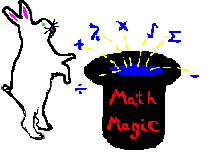

A. Adding sequences of this nature reduces to the following:
a + a/b + a/b2 + ... = a
1 - r
where a is the first term of the sequence and r is whatever a is being multiplied by, (in this case 1/b).
B. Look at the following examples:
Ex [1] 2 + 1 + 1/2 + ... = _________.
a. In this example 'a' is 2 since this is the first term and 'b' is 1/2 since every term is being multiplied by 1/2.
b. According to the formula this is equal to 2/(1 - 1/2) which equals 2/(1/2) which equals 4.
c. The answer is 4.
Ex [2] 6 + 4 + 8/3 + ... = __________.
a. In this example 'a' is 6 and 'b' is 2/3.
b. According to the formula this is equal to 6/(1 - 2/3) = 6/(1/3) = 18.
c. The answer is 18.
Ex [3] 12 - 4 + 4/3 - ... = __________.
a. In this example 'a' is 12 and 'b' is -1/3.
b. According to the formula this is equal to 12/(1 - -1/3) = 12/(4/3) = 9.
c. The answer is 9.